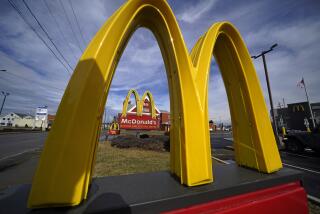Big Bear Settles Action on Labeling of Ground Beef
One evening about three years ago, a San Diego housewife making dinner noticed that the expensive, supposedly lean, ground meat cooking on the stove was oozing an inordinate amount of fat. The woman called the state Department of Health Services, which investigated the market that had sold the meat and in turn alerted the consumer fraud unit of the city attorney’s office.
What started with an alert consumer and a pound of hamburger ended last week with the settlement of a complaint brought by the consumer fraud unit against the Big Bear supermarket chain for allegedly mislabeling the fat content on packages of ground beef sold in five of its San Diego markets.
The complaint charged that the market’s stores on Federal Boulevard, Clairemont Mesa Boulevard, Adams Avenue, Jackson Drive and Mission Boulevard had sold various grades of ground meat containing a higher fat content than was indicated on the label. Big Bear was also charged with selling ground beef that exceeded the maximum 30% fat content. The market, while admitting no wrongdoing, agreed to pay a $5,000 penalty and to refrain from further mislabeling for one year.
James Bivins, an investigator in the fraud unit, said that 11 samples of ground beef were seized from the stores in 1982 and 1983, and 8 of the 11 were found to contain illegal amounts of fat. Bivins said the fat content in the samples ranged from 2% to 8% higher than government standards.
Bivins said there appeared to be no evidence of intentional wrongdoing on the part of Big Bear, just sloppy procedures and a lack of adequate meat supervision.
“From the evidence we obtained--memoranda, records, etc.--it appeared that the mislabeling was not knowingly done,” Bivins said. “It is most probable that the machines used to test the meat were not calibrated as they should have been, and from records it appeared that employees were just told to read the manuals to learn how to use them.
“It is our responsibility to see that the fat content is at or below the standard. A store doesn’t have to intend to defraud the public. They will be held liable if the standard is not met, no matter what the reason.”
James Munak, a lawyer for Big Bear Markets, said that under the terms of the settlement, Big Bear did not admit to any wrongdoing. Munak also disputed the results of the tests for fat content.
“It was a business decision to settle this case,” Munak said. “We felt that if we had to, we could have successfully defended against it. We tested samples of meat that were found to be within government guidelines. The products that we sell conform to the highest standards. We stand behind what we sell.”
More to Read
Eat your way across L.A.
Get our weekly Tasting Notes newsletter for reviews, news and more.
You may occasionally receive promotional content from the Los Angeles Times.











